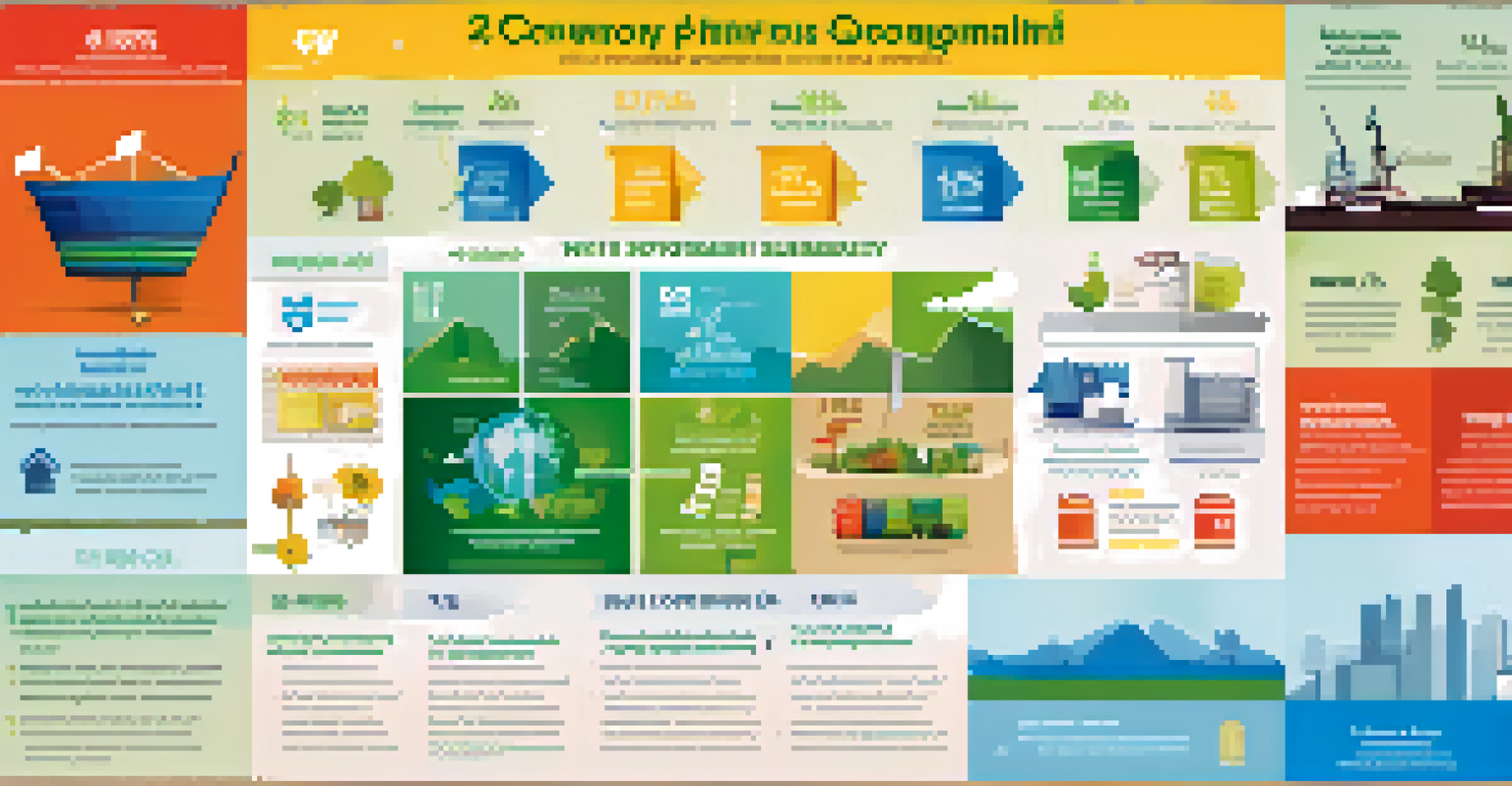The Future of Corporate Social Responsibility in Business

Understanding Corporate Social Responsibility (CSR) Today
Corporate Social Responsibility, or CSR, refers to a business model where companies incorporate social and environmental concerns into their operations. It's not just about profit anymore; businesses are increasingly held accountable for their impact on society. For example, many companies are now focused on sustainable practices that minimize environmental harm, reflecting a shift in consumer expectations.
Corporate Social Responsibility is not just a responsibility; it’s an opportunity to create shared value.
In today's world, consumers are more informed and passionate about social issues than ever before. This change has pushed businesses to engage in CSR, not just as a marketing strategy, but as a fundamental aspect of their identity. Companies that fail to recognize this reality may find themselves at a competitive disadvantage, as consumers increasingly favor brands that align with their values.
As we look to the future, the role of CSR will likely evolve even further. Companies will need to move beyond just ‘doing good’ to integrating these principles into their core strategies, making CSR a driving force for innovation and growth.
The Role of Technology in Shaping CSR Practices
Technology is playing a pivotal role in enhancing CSR initiatives across industries. From blockchain to artificial intelligence, these tools can improve transparency and accountability in corporate practices. For instance, blockchain can ensure that supply chains are ethical and sustainable, allowing consumers to trace the origins of their products.

Moreover, social media platforms provide a powerful avenue for companies to showcase their CSR efforts in real-time. Businesses can engage with their audiences, receive feedback, and adjust their strategies based on public response. This level of interaction creates a more authentic connection between companies and consumers, fostering trust and loyalty.
CSR Beyond Profits: A Necessity
Companies must integrate social and environmental concerns into their core strategies to meet evolving consumer expectations.
Looking ahead, we can expect an even greater integration of technology in CSR. Companies will leverage data analytics to better understand their impact and refine their strategies, making CSR not just a responsibility but a competitive advantage.
Expectations of Stakeholders in Corporate Responsibility
Stakeholders, including employees, customers, and investors, are increasingly expecting businesses to take a stand on social issues. This expectation can drive companies to adopt more robust CSR practices, reflecting a broader societal shift towards accountability. For example, employees may seek workplaces that align with their values, prompting companies to prioritize ethical practices.
The greatest danger in times of turbulence is not the turbulence; it is to act with yesterday's logic.
Investors, too, are paying closer attention to a company's CSR efforts. With the rise of ESG (Environmental, Social, and Governance) investing, shareholders want to ensure that their investments support responsible companies. This trend has led to a demand for greater transparency regarding a company’s social impact and sustainability efforts.
As we move forward, the pressure from stakeholders will likely intensify, pushing businesses to innovate and adapt their CSR strategies. Companies that engage their stakeholders effectively will not only build stronger relationships but also enhance their reputation and resilience in the market.
The Impact of Regulatory Changes on CSR
Regulatory changes are shaping the landscape of CSR, compelling companies to adopt more stringent practices. Governments around the world are implementing policies that require businesses to report their sustainability efforts and social impacts. This regulatory shift is not just a trend; it's becoming a standard expectation in many industries.
For instance, the European Union has introduced regulations aimed at enhancing corporate transparency regarding sustainability. Companies that fail to comply face significant penalties, pushing them to prioritize CSR in their operations. This regulatory pressure can drive innovation, as businesses look for new ways to meet compliance while also maximizing their social impact.
Tech Enhances CSR Transparency
Emerging technologies like blockchain and AI are improving accountability and engagement in corporate social responsibility initiatives.
In the future, we can anticipate an even more rigorous regulatory environment around CSR. Companies will need to stay ahead of these changes and view compliance not as a burden, but as an opportunity to enhance their reputation and drive positive change.
The Growing Importance of Environmental Sustainability
Environmental sustainability is becoming a cornerstone of CSR, as businesses recognize the urgent need to address climate change. Companies are increasingly adopting sustainable practices, such as reducing waste and utilizing renewable energy sources. For example, many corporations are setting ambitious goals to achieve net-zero emissions by a specific date.
This focus on sustainability is not just good for the planet; it also resonates with consumers who are more environmentally conscious. Brands that successfully implement sustainable practices can differentiate themselves and foster customer loyalty. Think of it as a win-win: companies help the environment while simultaneously appealing to their audience's values.
As we look ahead, environmental sustainability will likely become even more integrated into corporate strategies. Companies that embrace this shift will not only contribute positively to the world but also position themselves as leaders in their industry.
The Rise of Social Equity in Corporate Strategies
Social equity is gaining prominence as a critical aspect of CSR, with businesses striving to address inequalities in society. This shift is prompting companies to assess their impact on diverse communities and implement initiatives that promote inclusivity. For instance, many organizations are focusing on diversity in hiring practices and creating programs to support underrepresented groups.
Consumers are increasingly aware of social injustices and are looking to brands that take a stand. As a result, businesses that prioritize social equity are finding that they can build a more loyal customer base. It's not just about doing good; it's about aligning with consumer values and demonstrating a commitment to making a difference.
Stakeholders Demand Corporate Action
Investors, employees, and consumers increasingly expect businesses to take a stand on social issues, driving the adoption of robust CSR practices.
In the future, we can expect social equity to be a central theme in CSR discussions. Companies that proactively address these issues will not only enhance their brand image but also contribute to a more equitable society.
Measuring the Impact of CSR Initiatives
Measuring the impact of CSR initiatives is essential for companies to understand their effectiveness. Businesses are increasingly adopting metrics and frameworks to evaluate their social and environmental contributions. For example, the Global Reporting Initiative (GRI) provides guidelines for organizations to report their sustainability efforts.
However, measuring impact goes beyond just reporting numbers; it involves storytelling. Companies need to communicate not only their achievements but also the challenges they face in their CSR journey. By sharing their stories, businesses can connect with stakeholders on a deeper level and inspire others to take action.

As we move forward, the emphasis on impact measurement will grow. Companies that can effectively demonstrate the value of their CSR initiatives will not only enhance their credibility but also attract more support from consumers and investors.